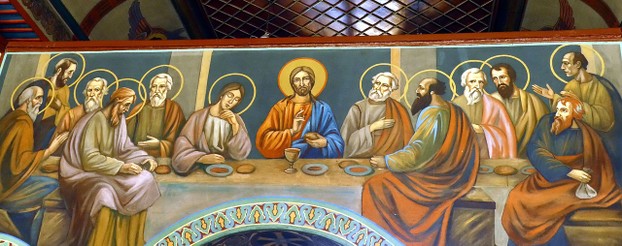Today is Spy Wednesday, and tomorrow the Christian church celebrates Maundy Thursday, Jesus' gathering with his twelve apostles to eat their final meal. Or were there only twelve apostles present? While Matthew 26 has Jesus eating with the twelve apostles, Mark 14 has Jesus speaking of a large upper room. Well, you could get thirteen at squeeze into my living room, which is not very large, so why have a large one unless there were more than just the apostles at the supper? We know that some women were with Jesus, and so, as the Passover is a meal for the assembled community, male and female, why would Jesus have excluded his own mother and other treasured women, such as Mary Magdalene? Moreover, Mark's Gospel says that Jesus was eating the meal with his disciples, a group wider than the twelve. So I believe that a larger group was present at the supper.
The basis of the idea that only the apostles were present at the Last Supper is that it was then that Jesus instituted the priesthood, which has been traditionally male, so women could not have been present, but that is a weak argument, for the last supper was the first Eucharist, the ceremony in which the Christian community bands together. At this all members are welcome, so it is necessary that there were both women and men present at the supper.
So what is the significance of the Last Supper for Christianity? Like its sister faith, Judaism, Christianity is a community religion, and both of these faiths believe that religion involves being member of sacred community centred round God. Judaism is a faith founded on God's covenant with the sacred people of Israel; while Christianity celebrates the new covenant with all humankind instituted by Christ. Each of these faiths has its covenant meal; the Jews have the Passover feast to celebrate their liberation from slavery in Egypt; the Christians have their own Eucharist to celebrate Jesus' death and resurrection in which God took upon himself what the powers of evil could throw at him and came out victorious at the resurrection. The Jews celebrate the Passover once a year; Christians celebrate the Eucharist almost everyday, Good Friday being the exception.
Jesus must have enjoyed table fellowship with his disciples, where the assembled group gathered around their master, humans congregating around the incarnate word of God.But at the Last Supper a change was wrought. As this was to be the final meal that he would eat before his death he announced that the meal was to be in memory of him and that the bread and wine were his body and blood. The word for memorial is anamnesis, which mean a reliving, so the implication is that somehow Jesus' presence is relived in the Eucharistic ceremony and the church has taken this to mean that he is present in the sacred elements of bread and wine. This is a doctrine that puzzles many people, but I think it necesssary to assert that religion can and does contain elements of mystery, for it deals with realities that are beyond the reality of the physical world.





 TheThousand Year Gardenon 11/26/2025
TheThousand Year Gardenon 11/26/2025
 Women of the Gospelson 10/11/2025
Women of the Gospelson 10/11/2025
 Religious Gardenson 08/25/2025
Religious Gardenson 08/25/2025
 Doctor of the Church: John Henry Newmanon 08/03/2025
Doctor of the Church: John Henry Newmanon 08/03/2025



Comments
No. There is almost nothing we know about Judas.
Thank you for your comment below in answer to my previous observation and question.
Does Christian tradition give us a family history of Judas in terms of ancestors and of birth and extended family relatives and of possible wife and children?
Judas' motives are a a mystery. No evidence is available.
Thank you for your comment in answer to my previous observation and question.
English Wikipedia describes Judas Iscariot as a spy who delivered Jesus Christ to those out to destroy Him.
Did Judas spy for whoever would pay or was he a spy exclusively for the Sanhedrin?
We really are in the dark on this matter.
Thank you for your comments in answer to my previous comments and observations.
Elizabeth Wayland, in her Mummies of Urumchi associates ancient Gaelic speakers in their trek from Asia through continental Europe to the British Isles with horse-raising skills, impressive textiles, salt-minable sites and stunningly defensive coastal sites.
Where might the "best" salt have been obtained during Jesus Christ's lifetime?
Might some such sites have been continuously operated since Gaelic-speaking times or was there no such thing as Gaelic speakers in His biogeographical area before and during Jesus Christ's lifetime?
1: Aristotle specified salt because it was valuable and implied that something significant was being given.
2: Spy Wednesday is a traditional term now not commonly used, but still understood.
3:I had never heard of Judas' double face, but it might be a way of saying that he was "two faced" which is a term meaning treacherous. He could have been Christlike, as one side resembled Jesus, but he had another side. But nowhere in Scripture do we have a description of any apostle.
frankbeswick, Thank you for the beautiful article and photo.
Do we know why it is that Aristotle specified salt?
I'd not heard the phrase Spy Wednesday so I had to look it up! If the shoe fits... . Is it commonly used on your side of the pond (because perhaps it's not locally if not regionally or even nationally on this side)?
The mention of Judas in the comments below made me think of something -- that's related but in another direction from your article -- I've meant to ask you. A nineteenth-century Russian orthodox painter or writer painted or wrote about Judas as having a face whose two sides were different, with one of them somewhat resembling Jesus' face. Is this something that you've come across?
Your depth of understanding theology exceeds that of many, indeed most, people.
Frank, check your first paragraph for the word Supper, a typo (Spuper). Then you can delete this comment.
You are right about time being for our world, so it is the case that when dealing with the great act of salvation we are dealing with events that cannot be explained in terms of our human spatio-temporal conceptualiation of the world.
I believe that we can make a move to understanding how this event is present today by realizing that they key to comprehension is the Risen Christ, the event is still present because Christ is alive, so the person in whom the salvific event happened is still with us.